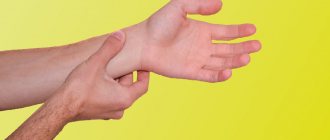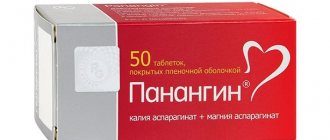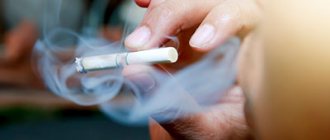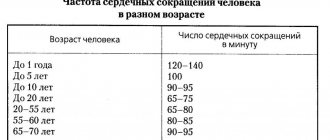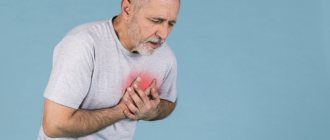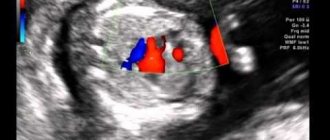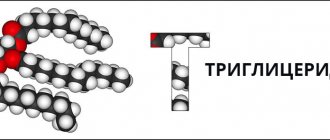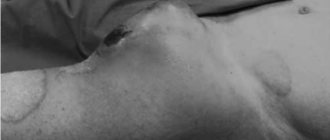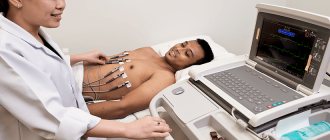In our heart there is a group of special cells that produce electrical impulses and cause the atria and ventricles to contract in a certain rhythm and sequence.
Thanks to special cells and its own electrical conduction system, the heart works in a certain rhythm and sequence
The brain is not able to give the heart the command to stop, work faster or, conversely, slower. However, it is wrong to say that the heart works completely autonomously. The heart rate is influenced by the autonomic nervous system, which consists of two divisions - sympathetic and parasympathetic.
Physiology of the autonomic nervous system
The sympathetic nervous system is responsible for the heart’s reaction to physical activity, stress, the entry of nutrients or toxic substances into the blood, and other external or internal stimuli. It dominates during the waking period, during daylight hours. The stronger the stimulus, the higher the heart rate.
The parasympathetic department prevails during rest and, especially, night sleep, allowing the “perpetual motion machine” - the heart muscle - to work in a more relaxed mode. Doctors figuratively call the night the “kingdom of the vagus,” the vagus nerve (vagus, lat.) – the “chief manager” of the parasympathetic system.
The functioning of the parasympathetic nervous system can be disrupted for a number of reasons, one of which is poor quality sleep at night. Only if sleep goes through all its phases (stages) and cycles, the autonomic system does not suffer and the heart gets the opportunity to fully rest.
Stages of the sleep cycle
Normally, in an adult, the difference between the average daytime and nighttime heart rates reaches 7-10 beats per minute, and the heart rate during sleep depends on age and gender.
Symptoms
The complaints of people who have suffered such an attack are similar to one another: “I sleep terribly, I suddenly wake up at night from a strong heartbeat, I can’t breathe normally, I can’t sleep, I break out in a cold sweat.” The essence of the complaints is disturbance of night sleep and a feeling of a racing pulse.
Frequent interruption of night rest, when the heart beats strongly, leads to the fact that a person gets up after sleep without a feeling of freshness, broken, and unable to concentrate during the day. Insomnia often occurs.
The somatic side of the attacks - increased heart rate - is combined with the psychological - panic attacks. They frighten a person, but since they occur at night during sleep, they take the form of disturbing or nightmare dreams. Having awakened, a person does not regard dreams, even terrible ones, as a reason for concern about health.
You can do nothing if sleep is disturbed by attacks of tachycardia only occasionally. When your heart beats at a frantic rhythm from night to night, you cannot remain careless: you cannot do without the help of a competent doctor. Ignoring the problem of a strong heartbeat is fraught with aggravation of attacks.
The following signs indicate a deterioration of the situation and the transition of night palpitations to a more severe form:
- the appearance of chest compression;
- heartache;
- feeling dizzy
- loss of consciousness.
These symptoms join existing night attacks and signal the need to see a doctor as soon as possible.
Taking sedatives and sedatives
Since rapid heartbeat before bedtime is most often provoked by psychosomatic causes, specialists often prescribe tranquilizers and sedatives as auxiliary or primary therapy:
- "Atarax" belongs to the group of new generation tranquilizers. Promotes quick fall asleep and sound sleep. Reduces anxiety, excitement, hyperactivity.
- "Adaptol" is ideal for patients whose problems with heartbeat are provoked by a difficult life situation and constant anxiety. This is an excellent sedative, the effect of which begins already on the third or fourth day of use. The patient stops worrying about trifles and quickly falls asleep.
- "Fitosedan" is a completely natural product based on plant components. It has a sedative, sedative and hypnotic effect. has virtually no side effects. In rare cases, may cause allergic reactions.
Types of arrhythmia
The first examination performed for any heart rhythm disturbance is an electrocardiogram. Analysis of ECG curves made it possible to divide rhythm disturbances present in patients with night-time tachycardia into several types:
- extrasystoles;
- migration of the pacemaker to the AV node;
- blockade of pathways;
- sinus arrhythmia.
Tachycardias at night, accompanied by a lack of breathing (apnea), are observed strictly in a state of sleep
Upon waking up and throughout the day, the heart continues to beat at a normal rhythm, there is no discomfort. With successful treatment of sleep apnea, nocturnal tachycardia stops.
Clinical case
In my practice, there was a case of sinus tachycardia in a pregnant woman.
The woman constantly felt a rapid heartbeat, which was an adaptive reaction of the body: pressure decreased, heart rate increased; but the patient was also diagnosed with anemia. After correcting the hemoglobin level with iron supplements, her health improved and the feeling of palpitations disappeared. Although at first the woman was sincerely surprised when she was not prescribed drugs to slow down her pulse! Depending on the location of the source of excitation, tachycardias are divided into supraventricular and ventricular.
The first arise in the structures of the heart up to the level of branching of the trunk of the His bundle: in the atria, AV node, in additional conduction pathways. The source of origin of the latter is the His bundle, Purkinje fibers, and ventricular myocardium.
Based on the nature of the course, paroxysmal and non-paroxysmal types of pathology are distinguished.
According to the mechanism of occurrence - reciprocal, ectopic, with trigger activity, and so on.
Differential diagnosis of arrhythmias is a difficult and responsible task. In particular, when it comes to tachycardia with wide QRS complexes on the ECG. This may be a ventricular arrhythmia or tachycardia involving the accessory tract (accessory tract).
Ventricular tachycardia has a poor prognosis and occurs as a result of damage to the heart muscle. In contrast, arrhythmia involving the AP appears in a person without gross structural pathology of the heart.
To clarify the type of tachycardia, an ECG with an intrathoracic lead should be recorded or a transesophageal electrophysiological study should be performed. However, in real clinical practice, such an opportunity is rarely provided, and in these situations the doctor is guided by the following rule: assess the condition as the most dangerous to human health and life and begin appropriate treatment.
Causes of tachycardia
The transition of the body into a state of sleep is accompanied by the transfer of control from the cerebral cortex inward - to the department of the reticular formation. The active state of the retinal formation inhibits the sympathetic department and increases the tone of the parasympathetic part of the nervous system.
Parasympathetic has a multifaceted influence on all life processes. If there are hidden health deviations under parasympathetic nighttime influence, they become aggravated. This happens with nocturnal tachycardia.
Low vagal tone
The vagus nerve (nervus-vagus), part of the parasympathetic division, reduces the pulse by suppressing the activity of the sinoatrial node. For this reason, at night, a healthy person’s heart beats at a slow pace and blood pressure is reduced.
But insufficient vagal tone allows the sympathetic nerves to remain in a position of dominance. The effect of sympathy on the heart rhythm is exactly the opposite - an increase in the heart rate. The smooth muscles of the intestine are affected by the vagus nerve; in response to increased vagal tone, peristalsis (movement) of the intestinal loops increases.
Neuroses, panic attacks
Frequently observed causes of nocturnal tachycardia are prolonged stress, driven inside the consciousness, and long-standing fears. Each process that occurs in the cerebral cortex and is not completed forms a focus of pathological excitation in it with stable neural connections.
In a state of sleep, the cerebral cortex tries to remove the pathological focus - and the person dreams that he is trying to cope with repressed fear. Sometimes a dream ends with victory over fear. This means that the brain destroyed the pathological focus in the cortex.
In psychiatric practice, such dreams are referred to as “catharsis” - liberation from fears repressed into the subconscious. In a cathartic state, there is a huge release of emotions - a constant sign of getting rid of the pathological focus. Night tachycardia, along with other symptoms, is the physiological side of cleansing catharsis.
In the morning, a person does not remember why he suffered from night terrors. A similar mental defense mechanism is designated by the psychoanalytic term “repression.” The specialist’s goal is, together with the patient, to find repressed thoughts and fears and help the patient destroy them in a state of consciousness.
Nocturnal hypertension
Why does blood pressure rise at night during sleep?
Attacks of palpitations at night can be caused by a rise in blood pressure in hypertensive patients, if the effect of blood pressure-lowering drugs has ended earlier than expected.
This happens when a patient misses a dose of an antihypertensive drug or takes an insufficient dose. Regular repetition of cases when the heart is pulsating strongly, closer to the onset of morning, means that it is time to see a doctor to adjust drug therapy.
After the examination, the doctor will delve into the complex pathogenesis of the nocturnal rise in blood pressure and prescribe new doses or new antihypertensive drugs. In people suffering from hypertension, a characteristic rise in blood pressure occurs in the morning and signals the need to seek medical help!
Apnea syndrome
Suspending breathing while a person is sleeping is a common cause of an attack of nocturnal tachycardia. The most banal option: the lack of breathing is caused by obstruction of the respiratory tract - the tongue simply relaxes and closes the throat.
Breathing disappears for a few seconds - minutes. Oxygen deficiency causes activation of the respiratory center in the medulla oblongata - breathing movements become more frequent and deeper, the heart beats loudly. At the moment when the inhalation force is higher than the air resistance in the respiratory tract, snoring occurs. The sleeper wakes up from his own snoring or the REM sleep phase begins.
Snoring people not only disturb their loved ones, but also harm themselves. Because of snoring, the sequence of rapid and slow-wave sleep is confused, and as a result, the person is not able to get a good night's sleep. During apnea, the heart muscle suffers from a lack of oxygen. This is fraught with the development of angina, when there is pain in the chest area and the heart is pounding.
The state of lack of breathing at night creates stress for the cerebral cortex, which results in disturbing and nightmare dreams
At the start of apnea, the heart slows down and beats more slowly. When the period of apnea has passed and the person has woken up, breathing and heart rate increase to compensate for oxygen deprivation.
Other causes of nighttime palpitations
Types of pathology that can lead to the appearance of a strong night pulse:
- organic disease of the heart muscle, pathology of the endocrine glands (diabetes, thyrotoxicosis);
- uncontrolled use of cardiac medications, alcohol and nicotine poisoning, acute viral infections;
- reduced hemoglobin content in the blood - anemia.
The reason remains unknown? Such cases are called “idiopathic”.
Causes of physiological tachycardia
In a healthy body, the heart rate increases in many situations.
- Getting physical activity. This includes sports, physical work, muscle tension of various origins.
- A moment of emotional stress. Emotions - any - must be strong.
- Being in a threatening external environment. This is dirty air, lack of oxygen at altitude or in a stuffy room, increased ozone content in the post-storm air.
- A rise in body temperature, for example, during a cold. Surely it is angina that gives you the feeling that you are shaking. After all, there is a “10 to 1” rule: the heart rate increases by 10 beats for every rise in temperature by 1 degree.
- Overeating attacks. Excessive eating often causes an increase in heart rate.
- Allergy attack.
- Menopausal flushing of the face and upper body.
- Taking energy liquids. Heart palpitations can also increase from strong tea or coffee.
Nightmares
Nightmares can cause physical symptoms in the body and can cause a person to wake up with their heart pounding. They can also cause profuse sweating and shaking.
Nightmares can also cause feelings of panic. They are more common in children than in adults. However, you will not always remember the specific details of these nightmares.
Sleep paralysis can also lead to increased heart rate. In this case, the person cannot move after waking up. This usually causes intense feelings of fear and hallucinations, and may also cause chest tightness.
If nightmares are the cause, the rapid heart rate usually calms down soon after waking up.
Diagnostic methods
The main methods for diagnosing nocturnal tachycardia are:
ECG
The main method for detecting nocturnal tachycardia is to take an ECG. Performed when you first seek medical help.
An ECG helps to study the work of the myocardium during the day and exclude the presence of daytime heart rhythm disturbances
Holter cardiogram
To document the fact of nocturnal tachycardia when a person goes to bed gives a chance to take a Holter electrocardiogram. The mobile device is attached to the patient for a day. A Holter ECG will not only detect nocturnal palpitations, but will also make it possible to determine its type and severity.
Echocardiogram
Another name is ultrasound of the heart. Allows you to “see” on the screen all the structures of the heart: chambers, valve apparatus, vessels. The functioning of the endocrine glands is checked using blood biochemistry, ultrasound of the thyroid gland, and pancreas.
Diabetes
Diabetes is a disease that affects blood sugar levels. When blood sugar levels are low (hypoglycemia), people may experience heart palpitations and anxiety.
This is due to the release of adrenaline into the blood. Adrenaline is a hormone associated with the fight-or-flight response. The release of adrenaline can also cause:
- anxiety
- tingling
- sweating
Low blood sugar can also cause fatigue, confusion, hunger and nausea.
Over time, repeated episodes of high and low blood sugar can increase your risk of heart disease and other circulatory problems. Effective diabetes control helps reduce these risks.
Treatment
It is a common situation when cardiac pathology is the basis of the nightly “pranks” of the pulse. In this case, treatment aimed at getting rid of cardiac pathology will help. The main goal of therapy is to reduce the number of attacks and their severity. Indeed, in the presence of myocardial pathology, a violation of the rhythm of contractions gradually turns into a factor aggravating heart disease.
When the cause of night attacks is high blood pressure, the doctor prescribes antihypertensive drugs and determines the dose individual for the patient. As a rule, the evening dosage of the medication is increased. If the issue is sleep apnea, then everything is more complicated. Therapeutic measures in relation to it have a weak effect.
In all cases, doctors advise sleeping on your side. But sleeping people usually do not control the position of their own body in their sleep. For this reason, the only effective method is the use of special devices for ventilation. Such gadgets pressurize oxygen through a mask into the lungs of those sleeping.
To prevent your tongue from closing your windpipe at night, you can lose excess weight and cure ENT pathology. One hundred percent option: the doctor selects a gadget that fixes the position of the lower jaw while you sleep. Straining, changing body position, and taking a hot-cold shower will help quickly (but not for long) make tachycardia disappear.
Psychotherapy
The trigger for an increase in heart rate at night can be a mental injury, after which the patient wakes up for a long time, attacked by panic attacks. A qualified psychotherapist will help eliminate this problem. Beta-blockers and sedatives are indicated as medications.
General recommendations for nocturnal tachycardia - normalize sleep, increase the overall tone of the body
What causes your heart rate to fluctuate at rest?
If your heart rate fluctuates at rest, you need to pay attention to the following factors:
- age of the person - in the elderly, an increase in heart rate is considered normal if it is not accompanied by pain and shortness of breath;
- ambient temperature - if it is high, then vasodilation will certainly lead to an increase in heart rate, thus the body simply cools down;
- lack of fluid in the body - banal dehydration makes the blood thick, reduces the amount of plasma, and the heart has to work with redoubled force to maintain blood circulation;
- stressful situations - even at rest a person is able to worry, remember, look for solutions to problems and an increase in heart rate against the background of stress is also possible;
- excessive physical activity - if a person is specifically involved in sports and his pulse increases at rest, then he needs to either reduce the time of training and its intensity, or increase the rest time between them;
- emotional state - even slight excitement automatically leads to an increase in heart rate.
The listed factors relate to the physiological causes of pulse fluctuations at rest; they are quite easy to correct.
But if, against the background of the main symptom, a person is bothered by headaches, a feeling of pressure in the chest (the anatomical location of the heart), periodic increases in blood pressure, and dizziness, then it is worthwhile to undergo examination by a cardiologist. It is possible that pathologies such as microinfarction, heart failure, malignant neoplasms, infectious or inflammatory processes will be diagnosed - they may occur for some time without pronounced characteristic symptoms.
Signs and warning signs
Conditions when you need to pay attention to your health and immediately consult a doctor:
- the appearance of shortness of breath (I can’t breathe);
- noise in the ears, cranium;
- dizzy;
- it becomes dark in the eyes;
- there is weakness up to loss of consciousness;
- heartache.
You must immediately call an ambulance, and while waiting for it you must:
- free the patient’s neck and chest from tight clothing;
- provide air access to the patient (open the window);
- apply cold to your forehead, rinse your face with very cold water.
Prevention
To prevent attacks of nocturnal tachycardia from occurring, the best way out is to reduce the load from both physical labor and emotions, adhere to an active lifestyle that can enhance the reserve capabilities of the human body and bring the pulse back to normal.
You need to take control of the number of hours spent motionless (at the computer), remove all “nicotine poisoning sessions” from the regime, and avoid drinking 8 cups of coffee a day, especially before going to bed.
It is better to avoid heavy meals before bedtime and reduce the amount of quickly digestible carbohydrates. The body should receive almost the entire daily dose of calories in the first half of the day. Before going to bed, you should not engage in physical activity; it is better to take a walk or take a relaxing shower.
Female sex hormones
Waking up with a racing heart can also be related to your menstrual cycle. In particular, heart palpitations may occur due to changes in hormone levels in the body.
Significant changes in estrogen and progesterone levels in the body can cause heart palpitations in some women.
As they approach menopause, their estrogen levels naturally decrease, which can also cause their heart rate to increase. Hot flashes can also cause heart palpitations.
